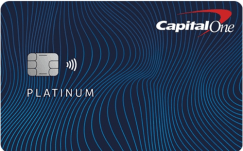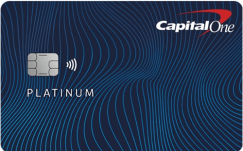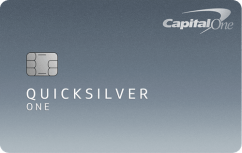At Experian, one of our priorities is consumer credit and finance education. This post may contain links and references to one or more of our partners, but we provide an objective view to help you make the best decisions. For more information, see our Editorial Policy.
If you're looking for your first credit card, you could start by trying to get a credit card that's created for people who are new to credit or rebuilding their credit. These cards often don't come with a lot of benefits, but you can use them to establish and build good credit before applying for a different credit card later. Here are four of the best options from our partners.
4 Partner Offers
Best Secured Card With a Low Deposit Amount: Capital One Platinum Secured Credit Card
Secured credit cards require you to send the card issuer a refundable security deposit when you open your account. Your security deposit will typically determine your credit limit, and there's often a $200 minimum deposit.
The Capital One Platinum Secured Credit Card is different from many secured cards because you might qualify for a $200 initial credit limit with a security deposit starting at $49.
If you want a higher credit limit, you'll need to send a larger security deposit before opening your account. However, Capital One will automatically consider you for a higher credit line in as little as six months with no additional deposit needed. It can also decide to refund your security deposit as a statement credit based on your responsible use.
In addition to potentially saving money on the security deposit, you won't pay foreign transaction fees or an annual fee for the Capital One Platinum Secured Credit Card. But it also doesn't offer any rewards.

Capital One Platinum Secured Credit Card
on Capital One's website
Recommended FICO® Score*
Capital One Platinum Secured Credit Card
APR
29.99% (Variable)
Intro APR
Rewards
None
Annual Fee
$0
Card Details
- No annual or hidden fees. See if you're approved in seconds
- Building your credit? Using the Capital One Platinum Secured card responsibly could help
- Put down a refundable security deposit starting at $49 to get a $200 initial credit line
- You could earn back your security deposit as a statement credit when you use your card responsibly, like making payments on time
- Be automatically considered for a higher credit line in as little as 6 months with no additional deposit needed
- Enjoy peace of mind with $0 Fraud Liability so that you won't be responsible for unauthorized charges
- Monitor your credit score with CreditWise from Capital One. It's free for everyone
- Get access to your account 24 hours a day, 7 days a week with online banking to access your account from your desktop or smartphone, with Capital One's mobile app
Best No-Frills Unsecured Card for Fair Credit: Capital One Platinum Credit Card
If you'd prefer to start with an unsecured credit card, the Capital One Platinum Credit Card could be a good option. You don't need a security deposit to open your account, and there's no annual fee or foreign transaction fee.
Capital One may approve an initial low credit limit, but you could be eligible for a limit increase in as little as six months if you've been making your payments on time.
The Capital One Platinum Credit Card doesn't offer any rewards, which may be a downside. But that might not be a big drawback if it's your first credit card and you only plan on using it for emergencies or to build credit.

Capital One Platinum Credit Card
on Capital One's website
Recommended FICO® Score*
Capital One Platinum Credit Card
APR
29.99% (Variable)
Intro APR
Rewards
None
Annual Fee
$0
Card Details
- No annual or hidden fees. See if you're approved in seconds
- Be automatically considered for a higher credit line in as little as 6 months
- Help build your credit through responsible use of a card like this
- Enjoy peace of mind with $0 Fraud Liability so that you won't be responsible for unauthorized charges
- Monitor your credit score with CreditWise from Capital One. It's free for everyone
- Get access to your account 24 hours a day, 7 days a week with online banking from your desktop or smartphone, with Capital One's mobile app
- Check out quickly and securely with a contactless card, without touching a terminal or handing your card to a cashier. Just hover your card over a contactless reader, wait for the confirmation, and you're all set
- Pay by check, online or at a local branch, all with no fee - and pick the monthly due date that works best for you
Best Unsecured Cash Back Card for Fair Credit: Capital One QuicksilverOne Cash Rewards Credit Card
For new cardholders who plan on using their first credit card for everyday purchases, a rewards credit card could save you money. The Capital One QuicksilverOne Cash Rewards Credit Card offers 1.5% cash back on every purchase. It's also an unsecured credit card and doesn't have a foreign transaction fee.
The flat-rate rewards can be easier to manage than a rewards card that offers different rewards rates depending on where you use your card. However, as with other rewards cards, the high variable interest rate can make it expensive to carry a balance.
While you'll earn cash back on purchases, the Capital One QuicksilverOne Cash Rewards Credit Card does have a $39 annual fee.
Read full review
Capital One QuicksilverOne Cash Rewards Credit Card
on Capital One's website
Recommended FICO® Score*
Capital One QuicksilverOne Cash Rewards Credit Card
APR
29.99% (Variable)
Intro APR
Rewards
1.5% Cash Back on every purchase, every day, 5% Cash Back on hotels and rental cars booked through Capital One Travel (terms apply)
1.5% Cash Back on All Purchases
Annual Fee
$39
Card Details
- Earn unlimited 1.5% cash back on every purchase, every day
- No rotating categories or limits to how much you can earn, and cash back doesn't expire for the life of the account. It's that simple
- Be automatically considered for a higher credit line in as little as 6 months
- Enjoy peace of mind with $0 Fraud Liability so that you won't be responsible for unauthorized charges
- Help strengthen your credit for the future with responsible card use
- Enjoy up to 6 months of complimentary Uber One membership statement credits through 11/14/2024
- Earn unlimited 5% cash back on hotels and rental cars booked through Capital One Travel, where you'll get Capital One's best prices on thousands of trip options. Terms apply
- Monitor your credit score with CreditWise from Capital One. It's free for everyone
- Check out quickly and securely with a contactless card, without touching a terminal or handing your card to a cashier. Just hover your card over a contactless reader, wait for the confirmation, and you're all set
Best Secured Credit Card That Doesn't Require a Credit Check: The OpenSky® Secured Visa® Credit Card
The OpenSky® Secured Visa® Credit Card stands out from other cards because it doesn't require a credit check. It can be a good option for someone who is having trouble getting approved for a card due to their lack of credit history. It's also popular among people who have bad credit and are rebuilding.
Additionally, the card is available without the need for a bank account—a requirement with many secured credit cards. You can send the refundable security deposit (there's a $200 minimum) by mailing a check or money order, or using a Western Union wire transfer. Once you open an account, your credit card account and payments will be reported to the three major credit bureaus (Experian, TransUnion and Equifax).
The primary downsides are the $35 annual fee, lack of rewards and 3% foreign transaction fee. If you don't mind the credit check and have a bank account, a different secured or unsecured card may be a better pick.
Read full review
The OpenSky® Secured Visa® Credit Card
on Capital Bank N.A.'s website
Recommended FICO® Score*
The OpenSky® Secured Visa® Credit Card
APR
25.64% Variable
Intro APR
Rewards
None
Annual Fee
$35
Card Details
- New feature! Earn up to 10% cash back on everyday purchases.
- No credit check to apply. Zero credit risk to apply!
- Looking to build or rebuild your credit? 2 out of 3 OpenSky cardholders increase their credit score by an average of 41 points in just 3 months.
- Get free monthly access to your FICO score in our mobile application
- Build your credit history across 3 major credit reporting agencies: Experian, Equifax, and TransUnion
- Add to your mobile wallet and make purchases using Apple Pay, Samsung Pay and Google Pay
- Fund your card with a low $200 refundable security deposit to get a $200 credit line
- Apply in less than 5 minutes with our mobile first application
- Fund your security deposit over 60 days with the option to make partial payments
- Over 1.4 Million Cardholders Have Used OpenSky Secured Credit Card To Improve Their Credit
How Old Do You Have to Be to Get a Credit Card?
You have to be at least 18 years old to open a credit card on your own. If you're younger, a parent or other relative may offer to add you as an authorized user on one of their cards. Being an authorized user might help your credit, but the account won't be in your name.
If you're under 21 years old—even if you're a full-time student—the federal Credit CARD Act requires you to have enough independent income or assets to afford the card's minimum payment. (You'll provide your income on the credit card application.) You'll also need enough income or assets to support a higher minimum payment if you want a credit limit increase.
The independent income could be from a part- or full-time job or a regular allowance that a relative sends. However, unless someone cosigns your credit card application (which often isn't an option), you can't include their income.
Once you're 21 or older, you can include another person's income on your application if you have a reasonable expectation that you can access the funds. A common example is a stay-at-home spouse who uses their working partner's income to qualify for a credit card.
What to Know Before Applying for Your First Credit Card
You may want to learn the basics about how credit cards work before applying for your first card. While credit cards can be helpful tools, some people end up carrying a high-interest balance after opening their first card and overspending. Ideally, you should use the card like you would a debit card and only make purchases that you can afford to pay off in full when the bill arrives each month.
If you've taken out a loan before—including student loans—or previously opened a credit card, you might already have a credit report. You can try to check your Experian credit report and your FICO® Score☉ based on the report for free.
If you have good credit, you may qualify for cards that offer more benefits or don't require a security deposit. But if this credit card is your first credit account, you likely won't be scoreable, and you may want to start with one of the credit cards for beginners. In either case, review the card's fees and benefits before applying.
It generally takes about 30 to 60 days for your new credit card to appear in your credit reports. And, it may take up to six months before your account makes you eligible for a FICO® Score. The credit card can continue to affect your credit scores for years to come—even if you close the account.
Paying at least your minimum monthly payment on time can help you build a positive credit history and avoid late payment fees. Ideally, you can also pay the bill in full each month to avoid interest. Only using a small portion of your credit limit can make this easier. And, it will lead to a low credit utilization ratio, which can also help your credit scores.
Keep Building Good Credit
Once you've established your first credit card account, look for ways to continue building a good credit history. An excellent score can make it easier to qualify for credit cards and loans with favorable terms. It could even save you thousands of dollars on auto loans and mortgages.
In addition to opening new credit accounts, you could use Experian Boost®ø—a free and easy way to potentially build credit. After signing up, you can connect your online bank accounts and add utility, telecom and popular streaming service payments to your Experian credit report. Your on-time payments can help boost your credit without you having to take on any new payments or debts.

